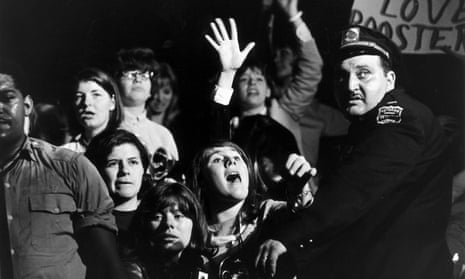A few weeks ago, while preparing to speak to a band called Mothxr, I came across an interview they’d given a couple of months earlier. In it, they were asked their favourite thing to see in the audience from onstage – and their answer was all too familiar. “Guys!” they said. “I’m not kidding!” I wish they were.
“A balanced ratio of men to women,” they continued, “means we have music listeners in the audience. When it’s all girls of a certain age, it’s likely that our music might not be their primary interest.” It’s probably worth pointing out here that Mothxr’s lead singer is Penn Badgley – who rose to fame in the TV series Gossip Girl. His anxious desire to distance himself from a show he feels he’s outgrown is a common one. But so, too, are comments like that.
Speaking to Rolling Stone at the end of last year, 5 Seconds of Summer estimated that “75% of our lives is [spent] proving we’re a real band. We’re getting good at it now. We don’t want to just be, like, for girls.” In order to prove themselves as a “real band” (apparently for the time being, they’re merely a figment of teenage girls’ imagination) they must gain the approval of men. Already, they explained proudly, they’re “seeing a few male fans start to pop up”. What an incredible moment that must be for them – to glimpse a man among a sea of female frivolity, each Y chromosome taking them one step closer to credibility. Never mind that they wouldn’t have been doing this interview if it wasn’t, like, for the girls that bought their records.
Still, it’s not exactly 5 Seconds of Summer’s fault that they’ve got such a distorted view of things. After all, they’re operating in a culture in which teenage girls are seen as the lowest common denominator of music fan. A culture in which older men are the bastions of good taste, the brave protectors of real music – while young women’s enthusiasm is dismissed as a sort of mass hysteria, blocking their ability to discern good from bad.
As a reviews editor, I’ve lost count of the number of times writers have – while bemoaning a gig’s drawbacks – referred derisively to the amount of “teenage girls” in the crowd. It’s as if that phrase itself is a code that needs no further explanation, no elaboration as to why a young woman’s fully paid-up presence at the gig is, unquestionably, a bad thing. It isn’t. Their judgments are just as legitimate, their enthusiasm just as credible, even if their screams are a little louder. And if you think their taste is indiscriminate, you’d be wise to remember that for every One Direction, there’s a thousand other bands who tried and failed to gain even a fraction of their success.
This is the case now, as it was 40 years ago. After David Bowie died, my mum dug out a £1 ticket from a Bournemouth gig she’d been to as a 15-year-old, alongside some old BBC footage of the very same show. Bowie, says the segment’s narrator, is “an object that is worshipped by millions of girls”. Later he decries, his voice plummy and faintly horrified: “It is a sign of our times that a man with a painted face and carefully adjusted lipstick should inspire adoration from an audience of girls aged between 14 and 20. Everywhere.” At this point, the level of panic bubbling up in his voice suggests he’s worried they might be infectious – “there are the girls”. Cut to 43 years later, and it seems those girls were pretty spot on as far as that “bizarre, self-constructed freak” Bowie was concerned. Just as they were with the Beatles.
I’m not suggesting, of course, that every band adored by teenage girls in 2016 will go on to be universally revered. (For one thing, the taste of teenage girls is far from a monolithic entity.) I certainly don’t think, even if they keep up the impressive feat of gaining male fans, that 5 Seconds of Summer are likely to be remembered in the same way as Bowie. But they’re no less likely to do so than a band enjoyed solely by older men with furrowed brows and an extensive vinyl collection. To look out into a crowd, or into your Twitter mentions, and immediately discount the approval of young women, is a foolish thing to do. Don’t bite the hand that feeds.
After interviewing Mothxr, and tweeting my dislike for their sentiments on gender, I got an email from Penn Badgley. He wanted to explain that he was pushed into answering that question, and that his quote had been taken somewhat out of context, but more so, he wanted to apologise. And to let me know that he’d changed his mind. “Every great band ever,” he conceded, “has played for a predominantly young female audience, and that audience is appreciative and invested and willing to scream and dance with abandon. Which is the point of music.” It sure is.
